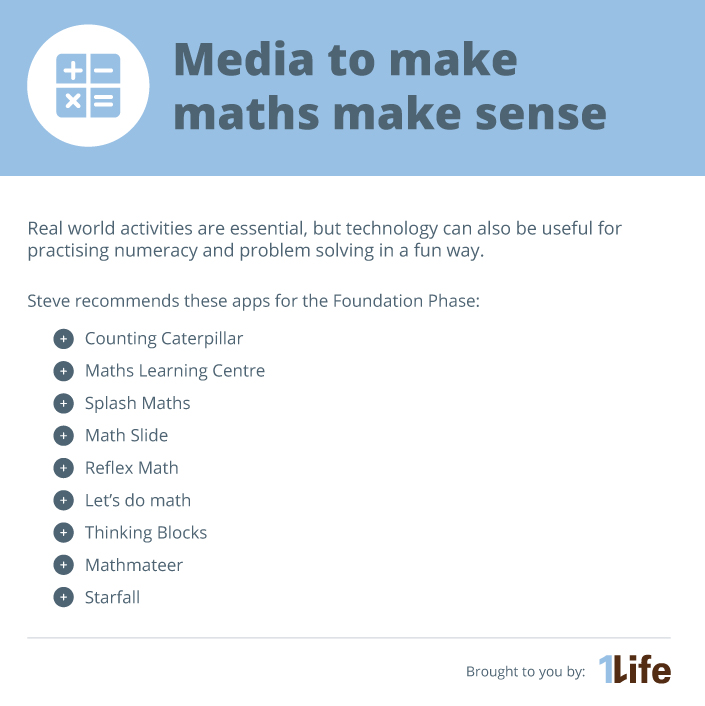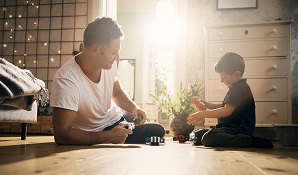In an era when maths and science are so important, how do you support your young kids in grasping mathematical concepts and practicing their number skills? The basic principles and the enthusiasm can be instilled in preschool and early primary school - and the key is to make it fun! We spoke to three maths experts and teachers for advice.
Don’t tell your children maths is “hard” or “boring” “I don’t believe in lying to your children, except, if you hated maths, don’t tell them that,” says Steve Sherman, the chief imagination officer of Living Maths, a maths enrichment and extension programme. “It gives them the excuse to not try and prepares them to think that it’s difficult or unexciting.”
Even if you must fake it, make maths exciting and interesting by going on a learning journey with your children. You may even find that you start to enjoy it yourself!
Make it concrete When children learn mathematics, they start with the concrete (here are two apples) and they move on to the abstract (the number 2). In our modern world, children are quite often distanced from the concrete, real world experience of numbers. They can count to ten, but they don’t get to play with ten blocks and put them in five piles of two, or two piles of five. It’s important not to miss out on the physical manipulation and counting of objects.
“We find that many children struggle with numeracy concepts because they haven’t been exposed to concrete examples of what numbers are,” says Lauren Howdon, a Grade 1 teacher at St Mary’s School in Johannesburg. “We don’t dial phone numbers anymore, the tooth fairy gives our children R20 or R50 instead of coins of different amounts, we put money in their bank accounts instead of giving them cash.”
She says that this lack of tangible numeracy makes it difficult for children to grasp what they are taught. For this reason, she says, it’s important to engage your children in numeracy play from a very young age.
Tech patterning and sequencing through routine and observation “Maths is creating order from chaos. It’s all about patterns and sequences,” says Anni Strauss, an A+ Students Abacus Maths teacher. “This is why routine is so important for small babies. It helps them to predict what’s coming next, which is early sequencing.”
Teach your children to recognise patterns like the repetition of a fern leaf or a pine cone. Show them how the traffic lights go from green to orange to red. Ask, what comes next? Or show them things that come in pairs, like socks or shoes, and let them help you match up socks with their partners. This type of pattern recognition may not seem very mathematical, but it is.
Prioritise an understanding over rote learning “Parents think that rote learning, counting or times tables, is the best way to start maths, but that’s actually counterproductive,” says Anni. “Children first need lots of hands-on experiences with building blocks and LEGO. They need to do sorting activities – sorting dinosaurs with horns from those that don’t have or sorting out farm animals from wild animals.”
She says that if you are showing very young children a numbers book with, for example, three ducks, make it even more concrete by having them fetch three objects to match the number on the page.
Go old fashioned Although iPads come with lots of great learning apps, don’t let your children miss out on physical games that involve numbers. Cards are great of course, starting with simple games like Snap. Even dealing out the cards is a counting activity.
Clapping games and marching games introduce counting and rhythm. Music is very mathematical - counting out the beats in a bar, for example - so if your child shows an interest, consider music lessons.
For older children, Steve recommends board games like Monopoly, “They learn to count spaces around the board, how much property costs, how to work out change and how to make decisions around value.”
The number plate game is fun. When you’re driving, start by looking out for specific numbers, and then move on to adding and subtracting to get to targets as they get older.
Look for learning experiences in real life Maths isn’t just about counting. It’s about weight and length and time and distance and shapes and all sort of things. When you go about your day, there are lots of opportunities to show your children how you use maths in daily life.
Anni offers some suggestions: “Take your children shopping and show them the prices and ask them which brand of yoghurt is better value. Talk about the weight of the different grocery bags and ask them to carry the lighter one rather than the heavier one. Talk to them about time. Ask them for help finding a street number you are looking for, ask them what number’s coming next and which way you should be travelling. Ask them to talk about shapes all around them – tree trunks are cylinders; traffic cones are cones.”
Use mathematical language Lauren says that it’s important not to dumb down mathematical concepts for small children (within reason). You can start by explaining that dividing means sharing between, but then use the word ‘divide’ the next time.
Teach them the actual names of shapes (you may need to swot up yourself), so that they are identifying a rhombus – not a diamond – along with squares and circles. “You’ll be amazed at how quickly children pick up even quite advanced concepts,” she says.
It’s important to praise them for their process as much as for the correct outcome.
Praise the process Steve says that it’s important to let kids know that mistakes are OK and are a part of the learning process. “They mustn’t be afraid to try new things,” he says.
Lauren says that students are often afraid of failure. “When things aren’t working out, they give up. They want things to work out perfectly right away. It’s important to praise them for their process as much as for the correct outcome.”
Support their interest If your child does turn into a maths whiz, give them the opportunity to practice their talent. “Children who are good at a subject can easily get bored in class while teachers help the children who are still learning concepts that your child has mastered,” says Steve.
For this reason, he suggests finding out about programmes offered at your school or in your area that your children can participate or even compete in. “It gives the talented child something to chew on. And even children who are not especially good at math can enjoy participating in after-school programmes and learning their different skills and approaches.”
These are some of the maths enrichment programmes available in South Africa:
A+ Students
Abacus Maths
Living Maths
Kumon
The bottom line The skills and support that children need to excel at maths are not that hard to impart. With a bit of thought, you can incorporate a little maths learning into their day, every day. You are your child’s first and best teacher – so become a maths expert and adventurer and bring the wonder of maths into their lives.





